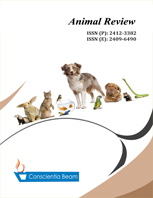In Vitro Differential Effect of Nerve Growth Factor on Functional Parameters of Murrah Buffalo Spermatozoa in Low and High Fertile Groups
DOI:
https://doi.org/10.18488/journal.ar/2015.2.4/101.4.87.98Abstract
Aim of the present study was to examine the influence of in vitro supplementation of Nerve growth factor (NGF) on functional parameters of Murrah buffalo (Bubalusbubalis) spermatozoa from fresh semen, like, motility, plasmalemma integrity, acrosomal integrity, ATP concentration. Fresh semen samples (n=6) were washed in Tris buffer and divided into two equal parts (control and NGF groups). Only in the NGF group, NGF was added to a final concentration of 50 and 100 ng/ml. The samples were incubated at 37o C for different time intervals in TCM 199 medium supplemented with BSA and the effects were observed at 0, 30, 60 and 120 min of incubation. The experiment was performed in low (LF) and high fertile(HF) groups based on previous three years conception rate and taking cutoff value , below and above this value were categorized as LF and HF group. The mean concentration of the buffalo seminal plasma (n=12) NGF was 67.7±3.25ng/ml and 65.5± 2.76 in LF and HF groups respectively. The concentration of NGF in blood plasma was 83.5±7.82 and 68.6±3.82 in HF and LF groups respectively. The concentration of blood plasma NGF being higher (P<0.05) in HF group. With either dose of NGF in vitro significant effect on the total motility (P<0.05), progressive forward motility (P<0.05) was observed. It could be maintained in HF group till 120 min but in LF group it was restricted to 60 min when compared with their respective control. The functional membrane integrity did not differ significantly between groups (control and NGF treated) in both LF and HF groups with either concentration of NGF. The plasma lemma integrity was significantly less (P<0.05) at 120 min of incubation when compared with the initial value at 0 min of incubation. The percentage of acrosomal intact spermatozoa decreased continuously over a period of time in both the groups. As compared to 0 min of incubation, the significant (P<0.05) loss of acrosome was observed at 60 and 120 min of incubation in LF and HF control groups and NGF supplementation could maintain acrosome integrity in HF group for 60 min where as in LF group it could be maintained significantly only till 30 min of incubation when compared with the initial values of respective groups. Viability of spermatozoa was not significantly different when compared between groups with their respective control, However when compared at different time intervals, the viability of sperms in HF and LF supplemented groups was significantly different from initial values only at 120 min of incubation whereas in respective control groups the loss in viability was significant from 60 min itself. With respect to ATP concentration of spermatozoa in different groups it was observed that 100ng dose could increase the concentration of ATP in HF group significantly (P<0.05) at 60 min of incubation only with NGF in vitro when compared with its respective control. In conclusion, all the parameters decreased significantly at 120 min of incubation when compared with their respective initial values for all the groups. In HF group supplementation of NGF@50ng/ml could maintain functional parameters of spermatozoa for a greater duration of time when compared with LF or control group.

